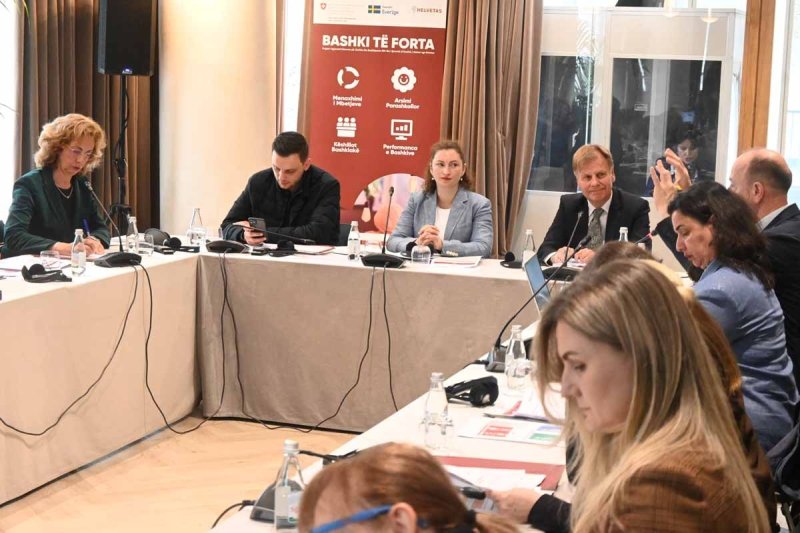Local Governance at the Centre of Political Debate
In the 2025 election campaign, Albanian political parties have turned their attention to local governance – no longer a secondary issue, but one of the fronts where the seriousness of reform and the capacity to govern closely are measured.
Territorial reform, once a symbol of administrative consolidation, is now at the heart of the political debate. Some political forces are calling for its full implementation to ensure more effective governance at the local level, while others are advocating for a review and the return of smaller municipalities, in the name of autonomy and better access for citizens.
A series of proposals have been put forward to empower municipalities, not only as administrative structures but as actors of economic and social development. This includes increasing competencies, more financial and human resources, and deepening cooperation with central government.
On the financial front, parties have responded to citizens' demands for economic relief through the limitation of local taxes, reduction of fees for basic services such as water, and even amnesty for local fines for citizens and small businesses.
Digitalization and meritocracy are two of the key words that frequently appear in political platforms. The automation of administrative processes, the elimination of discretion in decision-making, and employment based on skills are promised as ways to bring a more transparent and effective administration in service of the community.
Proposals for citizen involvement in governance are also not lacking, through structures such as Local Councils for Public Safety and the promotion of dialogue between institutions and the local community.
At its core, this year's campaign reflects a new awareness of the role of local governance. Despite the heated and polarized political climate, if we consider the political programs of the parties regarding local governance, several programmatic alliances would be created that reflect the ideological and programmatic affinities of the respective parties for local governance:
-A progressive center-left coalition, which includes the Socialist Party (PS), Nisma - Shqipëria Bëhet (Albania Can Be Done), and Lëvizja Bashkë (Together Movement). These parties have a clear alignment in several key areas, such as decentralization, education, social support, gender equality, and digitalization. All parties support the strengthening of local governance and investments in educational infrastructure, aiming to improve the quality of education. The commitment to increasing economic aid and support for vulnerable groups is another common point, as well as policies for equal gender representation and support for women entrepreneurs. However, waste management remains a hot topic, with PS supporting concessions, while Nisma is critical of them.
-On the other side of the political spectrum, the center-right reformist coalition includes the Democratic Party (PD) - Alliance for a Great Albania (ASHM), and the Opportunity Party - Euro-Atlantic Coalition. This coalition focuses on tax reduction, depoliticization of the administration, and the fight against corruption through SPAK. The annulment of abusive concessions and the strengthening of justice institutions are common priorities, as well as deep health reform and increased budget for this sector. Proposals for increasing economic aid and support for families in need are also part of their program. However, gender equality remains a debatable point, with PD and ASHM having more advanced policies compared to the Opportunity Party.
-Another possible coalition is the progressive left, which includes Lëvizja Bashkë and Nisma - Shqipëria Bëhet. These parties support decentralization and the strengthening of local governance, as well as the integration of vulnerable groups into the labor market and the increase of economic aid. Focus on critical thinking education and improvement of school conditions is another common point, as well as reform in public administration and the elimination of clientelist practices. However, gender equality remains a debatable point, with Lëvizja Bashkë having more advanced policies compared to Nisma.
In conclusion, Nisma - Shqipëria Bëhet plays a key role as a "balancer" in the political spectrum, while Lëvizja Bashkë has a program close to SP and Nisma but remains more critical of the system. PD and Opportunity Party can create an opposition bloc focused on anti-corruption and fiscal reform.
As the 2025 parliamentary elections approach, the focus on local governance highlights the evolving priorities of Albanian political parties. The above “virtual” coalitions, whether progressive center-left, reformist center-right, or progressive left, reflect a commitment to addressing the potential future of local governance in Albania, emphasizing the importance of effective, transparent, and inclusive administration to meet the needs of all citizens. / ADN
Note: This article presents contextual analyses conducted by Helvetas Swiss Inter-cooperation as part of their political context monitoring efforts. Contributions and insights from other experts on the monitoring team are highly encouraged and welcomed.













